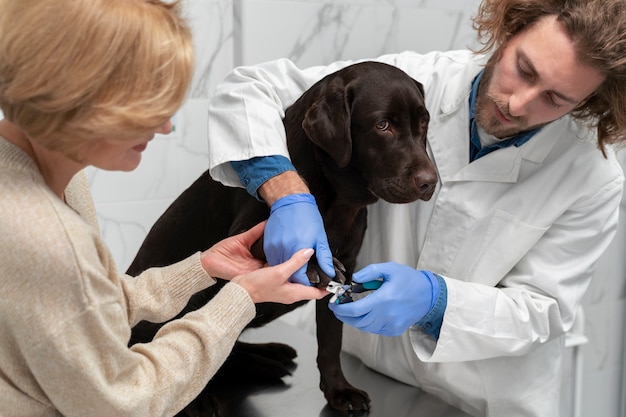What Happens During Pet Laceration Repair Surgery

What Happens During Pet Laceration Repair Surgery
When your pet suffers a cut, tear, or deep wound, it can be alarming and distressing. You want to help your companion heal quickly and comfortably, but it is not always clear when a minor scrape can be managed at home and when a wound requires urgent medical attention. At VetCheck Pet Urgent Care Center - Greenwood and Indianapolis, our experienced veterinary team is equipped to provide immediate emergency pet wound care, including advanced pet laceration repair surgery, for pets in Indianapolis and surrounding communities. Whether a playful romp turns into a painful injury or your pet is affected by an unexpected accident, our facility is here to help—no appointment needed and walk-ins are always welcome.
This blog will guide you through the entire process of pet laceration repair surgery, from recognizing when a wound requires professional attention to what happens during the procedure and how to ensure a smooth recovery at home. We will also cover the signs that indicate immediate care is needed and why prompt action is so important for preventing infection and further complications. If you are searching for "emergency vet near me" or want to know about pet laceration surgery in Indianapolis, you are in the right place. For more information on our specialized procedures, you can visit our page on laceration repair surgery.
Recognizing When Your Pet Needs Laceration Repair Surgery
Accidents can happen at any time, and as a pet owner, knowing when a cut or wound requires more than just basic first aid is essential. Some wounds may look minor but can hide deeper tissue damage or pose a risk of infection, especially if they involve the chest, abdomen, joints, or are the result of a bite.
Key symptoms that suggest your pet might need emergency pet wound care include persistent bleeding that does not stop after several minutes of gentle pressure, wounds with jagged or gaping edges, visible debris or foreign material in the wound, and lacerations that expose muscle, bone, or internal structures. Other warning signs are swelling, redness, or discharge from the wound, a foul odor, and changes in your pet's behavior such as limping, excessive licking, or vocalizing in pain.
If your pet is injured during evening hours, on weekends, or when your regular veterinarian is unavailable, seeking help from an "urgent care vet near me" can make all the difference. At VetCheck Pet Urgent Care Center, we provide emergency veterinary care for a wide range of injuries, including cuts, punctures, and more complex wounds.
When Home Care Is Not Enough
It is natural to want to help your pet at home, but certain situations require professional intervention to prevent further harm. Deep lacerations, wounds caused by animal bites, and injuries contaminated with dirt, glass, or other debris nearly always need veterinary assessment. Pets with underlying health issues, those who are very young or elderly, and wounds in sensitive areas such as the face or paws also warrant prompt attention.
What Causes Lacerations in Pets?
Understanding how lacerations occur can help pet owners minimize future risks and act quickly when needed. Lacerations are tears or cuts in the skin and sometimes deeper tissues, caused by sharp objects, accidents, or even other animals.
Common causes of pet lacerations in Indianapolis include encounters with sharp fencing, broken glass, or metal, altercations with other pets or wildlife, and accidents involving vehicles or machinery. During seasonal changes, ice and snow can also hide hazards that lead to cuts or tears in paw pads.
Additionally, pets that are allowed to roam freely outdoors or those who are particularly curious may be at higher risk for sustaining injuries. For these reasons, prompt response and access to pet laceration repair surgery in Indianapolis are crucial when injuries do occur.
How Laceration Repair Surgery Is Performed
If your pet is brought to VetCheck Pet Urgent Care Center for a wound that requires surgical intervention, our veterinary professionals follow a thorough and compassionate process designed to maximize healing and minimize discomfort. The approach is tailored to the nature of the wound, the pet’s health status, and any underlying risk factors.
Initial Assessment and Stabilization
Upon arrival, your pet will receive a prompt evaluation to assess the extent of the injury, control bleeding, and prevent shock. If needed, we utilize in-house diagnostics such as blood work or imaging to check for deeper tissue involvement or associated injuries. This immediate assessment is vital for pets with traumatic wounds, especially if there is a risk of internal injury or foreign bodies.
Our team will also address pain control as a priority, administering appropriate medications to keep your pet comfortable throughout their stay. Sedation or anesthesia is typically required for laceration repair surgery, both for pain management and to allow for thorough wound cleaning and closure.
Surgical Cleaning and Debridement
The next step in pet laceration repair surgery involves meticulous cleaning of the wound. All debris, bacteria, and damaged tissue are gently removed to reduce the risk of infection and promote healthy healing. This process, known as debridement, is critical for wounds that have been open for several hours or are contaminated.
In some cases, additional procedures may be recommended, such as x-rays to detect foreign bodies or underlying fractures. Deep or complex wounds, especially those involving muscle or joints, may require layered suturing techniques using dissolvable stitches beneath the skin and non-dissolvable sutures on the surface.
Closing the Wound
Once the wound bed is clean and healthy tissue is exposed, the surgical team carefully closes the laceration using the most suitable technique for your pet’s injury. This may involve simple suturing or, in more extensive wounds, advanced reconstructive techniques. The goal is always to restore function, minimize scarring, and support rapid, complication-free recovery.
Veterinarians may apply bandages, drains, or protective devices to reduce swelling and keep the wound clean during the initial healing phase. Your pet will be monitored closely for any adverse reactions to anesthesia or signs of complications.
Post-Surgical Care and Monitoring
After surgery, your pet may require full or partial day hospitalization for monitoring, especially if the wound was severe or your pet has underlying health concerns. Pain relief, antibiotics, and wound care instructions will be provided before your pet goes home. Our veterinary team will review the signs of infection, how to keep the wound clean, and when to return for follow-up care or suture removal.
Home Care and Prevention After Laceration Repair
Once your pet returns home after laceration repair surgery, diligent care is essential to prevent complications and ensure a smooth recovery. Following your veterinarian’s instructions and keeping a close eye on the healing process can make a significant difference.
Steps for successful home care include keeping your pet’s wound clean and dry, preventing licking or biting at the stitches using an Elizabethan collar or other protective devices, and administering all prescribed medications as directed. You should restrict vigorous activity until cleared by your veterinary team, as excessive movement can disrupt wound healing.
Watch for warning signs such as swelling, redness, oozing, or foul odor from the wound, as these may indicate infection. Contact your veterinarian promptly if you notice any of these symptoms or if your pet seems unusually lethargic or uncomfortable.
To help prevent future injuries, keep your pet indoors during hazardous weather, remove sharp objects from your yard, and supervise playtime, especially around unfamiliar animals or environments. If your pet has a history of chronic licking or self-trauma, discuss strategies with your veterinarian to manage these behaviors.
When Should You Seek Emergency Pet Wound Care?
Not all wounds require surgery, but knowing when to seek emergency pet wound care in Indianapolis can protect your pet from serious complications. You should bring your pet to an "emergency veterinarian near me" if you notice persistent bleeding, deep or gaping wounds, visible bone or muscle, or signs of significant pain or distress. Wounds obtained from animal bites or injuries that occur in contaminated environments should also be evaluated quickly.
If you are ever uncertain, it is safer to err on the side of caution. Delaying care can allow bacteria to multiply, increase the risk of infection, and ultimately make treatment more complicated. At VetCheck Pet Urgent Care Center, we are open during evenings, weekends, and holidays to serve pets when your regular veterinarian may be unavailable. Walk-ins are always welcome, and our team is trained to address urgent injuries with compassion and expertise.
For pets in Indianapolis and surrounding communities, finding a reliable "24-hour vet near me" or "pet laceration repair surgery near me" can mean the difference between a smooth recovery and ongoing health concerns. If you are unsure whether your pet’s injury needs immediate attention, our veterinary team is here to answer your questions and provide guidance.
Compassionate Emergency Laceration Repair Surgery in Indianapolis
When an accident happens, you want a veterinary team you can trust to provide fast, thorough, and compassionate care. At VetCheck Pet Urgent Care Center - Greenwood and Indianapolis, our commitment to your pet’s health goes beyond the basics. We offer advanced pet laceration repair surgery in Indianapolis with the latest surgical techniques, in-house diagnostics, and a focus on comfort and safety.
If your pet suffers a cut, wound, or other injury, do not wait—walk-ins are always welcome, and no appointment is needed. Our veterinary professionals are available during extended hours and are dedicated to helping your pet heal quickly. Whether you need emergency veterinary care, laceration repair surgery, or follow-up support, we are here for you every step of the way.
For immediate assistance or more information, call (317) 934-9953 or visit us at 5335 Southport Road, Suite 400, Indianapolis, IN 46237. For pet owners searching for "emergency vet near me" or "pet laceration repair surgery in Indianapolis," our team is ready to help your companion recover and thrive.
Disclaimer: This blog is for informational purposes only and is not a substitute for professional veterinary advice. Always consult with your veterinarian for specific concerns about your pet’s health or treatment needs. For more information on laceration repair and related services, please visit our laceration repair surgery page.





.webp)













